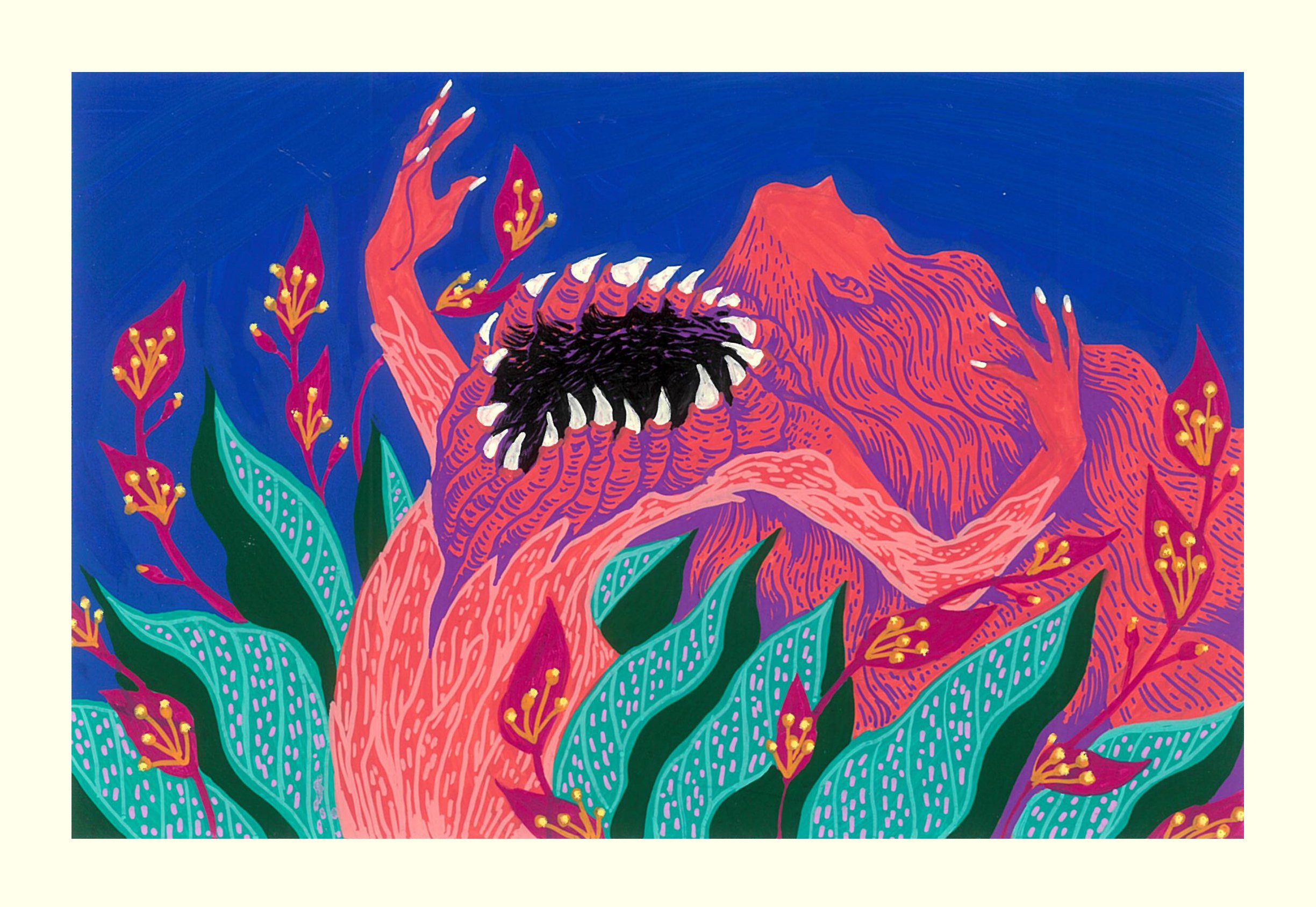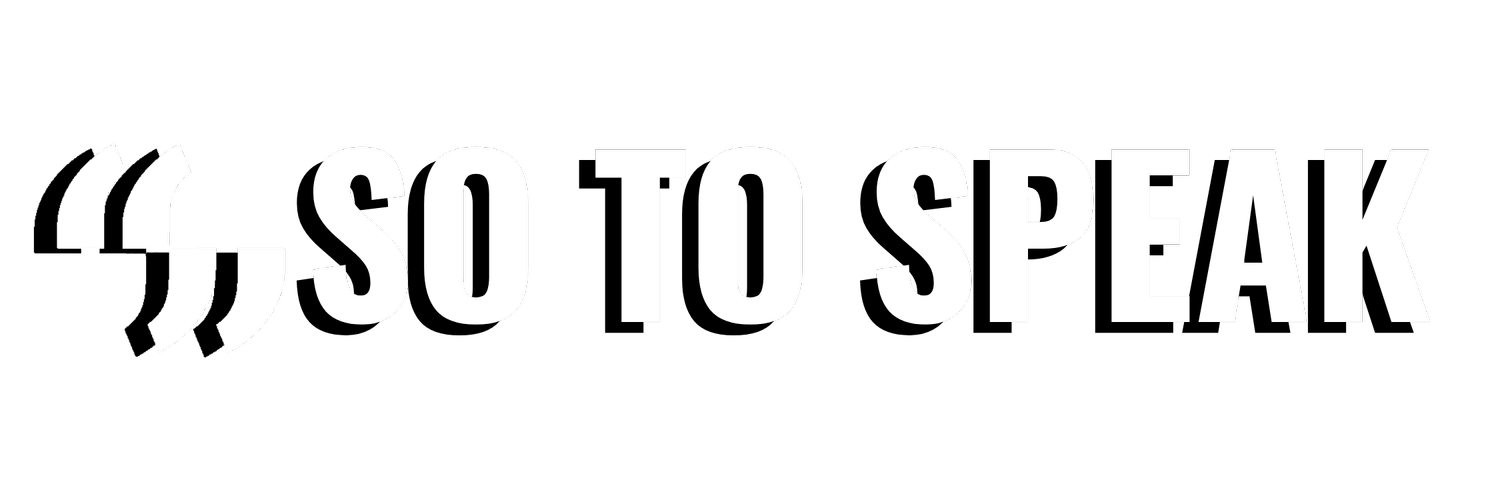
nonfiction, summer 2024
the plague
of boils
To speak of the girl’s body, that most-watched pot, is to acknowledge the way the body boils. To speak of her body hybrid, in flux, and more than once, interrupted, is to acknowledge her body aflame. Back burners simmering, front burners sizzling, and all burners aptly named the eye. Burning up. Seeing red. Sometimes these were literal—a sudden flush, a rush of blood to the surface of the skin. Sometimes figurative—how she tried to cauterize her thoughts but couldn’t stop each needle’s scorched tip from piercing more fiercely than the last. Hot-headed, they said, hot-tempered, they said, and most fitting still—spitfire. She wanted, by the end, to spit fire at all of them. Her mouth: full stop given way to flashing light. Her cheeks: pair of roadside flares. Her lips: red-lined and foreboding as a sailor’s morning sky. Take warning! This was adolescence: a prank, a joke: the slowest, sickest burn. What surprised her most about the new heat was its multi-valence—rage, shame, want—each pulsing at its center with a scarlet letter. Hard to say which red was which since the sear was always the same. Years before, her parents had collided at a store called Sears. Did they hear the heat in it? Both of them working there, both of them seared by something they decided to call love, which led to marriage, which led to her—only baby in their baby carriage. The way history is planted in a child before she is even born: all the spindly alleles of circumstance taking hold, beginning to sprout. Watched pot of their wishes, watched pot of their fears, she understood herself as figment of an arid imagination. Oasis or merely mirage? What relief could she provide in that desert? Mother’s skin always so clear. (Was there a gene for this, the absence of blemish?) Father’s skin ruddy from years under the dermatologist’s lamp—his sister, too. Hours they spent there: steaming rags and silver tweezers. Aunt still indentured to concealer, spackling her pores before every holiday meal. Mother mocking behind her back: “What woman is battling acne at that age?” The word onset, which was always the smoke to puberty’s fire. The girl already furious, her cigarette-body shedding heaps of ash. Then it happened, just the way her mother spoke, thick with adage, judgments nestled in the crease: “Mrs. So-and-So smokes like a chimney.” The girl became that chimney: fuller-bodied, sooty at her center, a flue for a heart. “Is it chicken pox?” the mother asked, stopping her daughter in the hall. She had never had them, presumed immune. Closer look. Magnifying glass. Contamination! “It’s your father you have to thank for this!” Heritage piling up in her, log upon log, brick upon brick. Everything a possible flint. “I won’t have it! My daughter will not proceed through life a pizza-face!” Donning that vernacular. Zit was soon to follow. Era of Clearasil. Era of Accutane. Era of Neutrogena foaming wash at waking and Retin-A medicated cream before bed. There it was again, that smoldering A, that scarlet letter newly visible, newly literal: nose, chin, chest, back. A litany of angry As. The first doctor explained: “Not just a few clogged pores. What we have here is cystic acne, infection under the skin.” Acute. Severe. The mother shrieked when she heard: boils. “How dare you suggest we’re unclean!” The second doctor explained: “Yes, these pustules are actually boils. Bacteria trapped deep in the pores that leads to a kind of eruption.” Breakout. Flare-up. A body committing arson against itself. Together they settled on a regimen: daughter as specimen, daughter as contagion. What else could it mean but punishment? Even the mother said as she squeezed, “It’s the meanness coming out of you.” Those unholy roses she plucked one by one: rage, shame, want. Lucifer! Beelzebub! God must have been angry, and this the evidence: her skin transformed into a smoking gun. Other words soon flourished in the family lexicon: Unsightly. Unbecoming. Undesirable. The un that preceded her now, and the a that had always been, signifying not, without. She had learned to swallow atypical like a gel-cap, anomalous like a tonic. The third doctor did suggest “this condition is sometimes exacerbated by stress.” At fifteen, she had all but sold herself on martyrdom. On a theology test, she wrote, “The women we like best seem to set themselves on fire.” Sister Rosemary circled this—her pen strokes red, a single question mark kindled in the margin. After school, babysitting to fight the charge of indolence. At night, her mother scalding cloths to fight the charge of follicles clogged, till pus gave way to blood. Rage, shame, want. “Blame your father for this!” The onset that became an onslaught, a constant inflammation, which was doctor-talk for burn. The girl learned a parlance she still refused to use. On the phone again with the clinic: “My daughter’s condition is not improving. In fact, if anything, I’d say it’s getting worse.” Spreading down her legs, fanning out her arms, unrepentant as any sinner who heard the Word and plugged her ears. The pain worsening, the heat intensifying, but then an itch accompanying the burn. Mrs. Lehmann called: “I thought I should let you know: our boys have come down with chicken pox, and your daughter’s been caring for them.” Notice how every conversation happened without her, around her (a-round). Two weeks home from school then. Neither place a sanctum. “What we have to worry about now is scarring,” the mother said as she paced. Now we’re worried about scarring? The daughter daubed a new cream on her skin, this one intended to soothe. Now we’re concerned about soothing? She watched a movie called Original Sins: a man hosts a radio show where people call in as an act of penance, a chance to confess past crimes while remaining anonymous. The mother said the man was good-looking enough to be on television. At this, the daughter sighed. The Church had renamed Confession the Sacrament of Reconciliation—to make it more appealing since penitents were dropping off. At this, the daughter scoffed. “Now you could give advice on the radio,” her mother mused. “You have such a nice voice, and someday you’ll have the expertise to go with it.” The daughter, forbidden from scratching more prominent parts, clawed at her scalp till it bled. By then, even her blood was boiling. And what did it boil down to, you ask? In class, she raised her hand: “Isn’t self-immolation redundant?” Sister Rosemary looked perplexed, and the other girls—well, she didn’t look at them. “I’m not sure I understand what you’re asking, dear.” Inside the girl was apoplectic (the persistent presence of that a! the reminder she was always lacking!), but outside she gleamed, a portrait of comportment coated in powder. “As a form of protest, I mean. Sure, you can be burned at the stake, Joan of Arc-style, but does anyone actually immolate—that word—who didn’t strike her own match?”
julie marie wade
is the author of many collections of poetry, prose, and hybrid forms, most recently Fugue: An Aural History (Diagram/ New Michigan Press, 2023) and Otherwise: Essays (Autumn House, 2023), selected by Lia Purpura as the winner of the 2022 Autumn House Nonfiction Book Prize. Her forthcoming projects include The Mary Years (Texas Review Press, 2024), selected by Michael Martone as the 2023 winner of the Clay Reynolds Novella Prize, and Quick Change Artist: Poems (Anhinga Press, 2025), selected by Octavio Quintanilla as the winner of the 2023 Anhinga Poetry Prize. She lives with her spouse Angie Griffin and their two cats in Dania Beach and teaches in the creative writing program at Florida International University in Miami.
